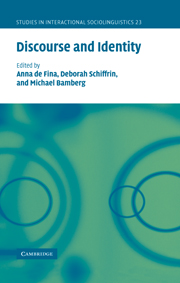Book contents
- Frontmatter
- Contents
- List of contributors
- Introduction
- Part I Overview: theory, method and analysis
- Part II Private and public identities: constructing who we are
- Part III The gendered self: becoming and being a man
- Editors' introduction
- 10 Hegemonic identity-making in narrative
- 11 On being white, heterosexual and male in a Brazilian school: multiple positionings in oral narratives
- 12 Urban fathers positioning themselves through narrative: an approach to narrative self-construction
- Part IV The in-between self: negotiating person and place
- References
- index
12 - Urban fathers positioning themselves through narrative: an approach to narrative self-construction
Published online by Cambridge University Press: 09 November 2009
- Frontmatter
- Contents
- List of contributors
- Introduction
- Part I Overview: theory, method and analysis
- Part II Private and public identities: constructing who we are
- Part III The gendered self: becoming and being a man
- Editors' introduction
- 10 Hegemonic identity-making in narrative
- 11 On being white, heterosexual and male in a Brazilian school: multiple positionings in oral narratives
- 12 Urban fathers positioning themselves through narrative: an approach to narrative self-construction
- Part IV The in-between self: negotiating person and place
- References
- index
Summary
Introduction
Many have argued that narrators can partly construct themselves when they tell autobiographical stories. For this reason, autobiographical narrative has been proposed as a therapeutic tool (Anderson 1997; Cohler 1988; White and Epston 1990), as a means to critique unjust social orders (Personal Narratives Group 1989; Rosenwald and Ochberg 1992; Zuss 1997), and as an educational tool (Cohen 1996; Witherell and Noddings 1991). This body of work makes at least two important points. First, the “self” is not an unchanging entity beyond the reach of everyday human action, but is something that can under some circumstances be changed with effort. Second, changing the self can happen through the social practice of narration, not just through the activity of an isolated individual.
Although this work on narrative self-construction promises both theoretical insight into the processes of self-construction and practical tools for changing the self, most of it has failed to provide a comprehensive account of how autobiographical narration can actually construct the self. A full account would require three components: a linguistically sophisticated account of how narrative discourse creates relevant patterns; an account of the mechanism through which these discursive patterns influence social and psychological processes; and a theory of what the self is, such that it can be partly constructed through some narrative mechanism. Most existing work on narrative self-construction includes only one or two of these components.
- Type
- Chapter
- Information
- Discourse and Identity , pp. 314 - 342Publisher: Cambridge University PressPrint publication year: 2006
- 20
- Cited by



